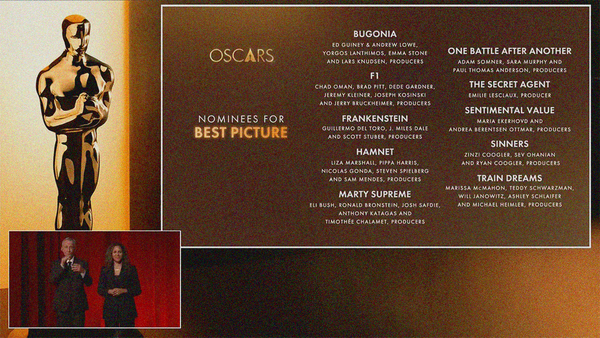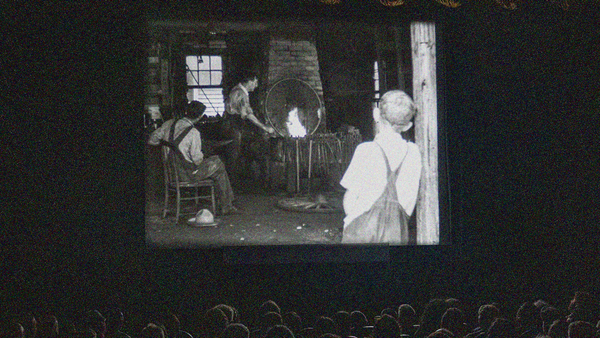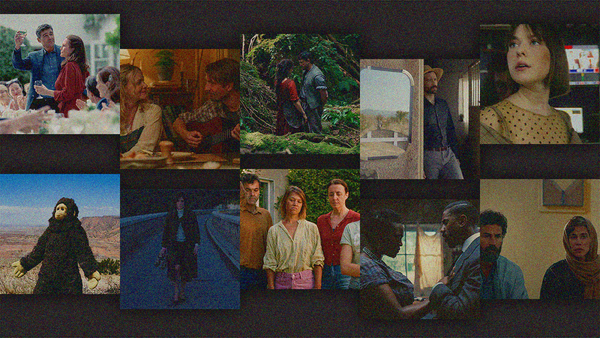TIFF 2025: Day Ten
TRY to be courteous
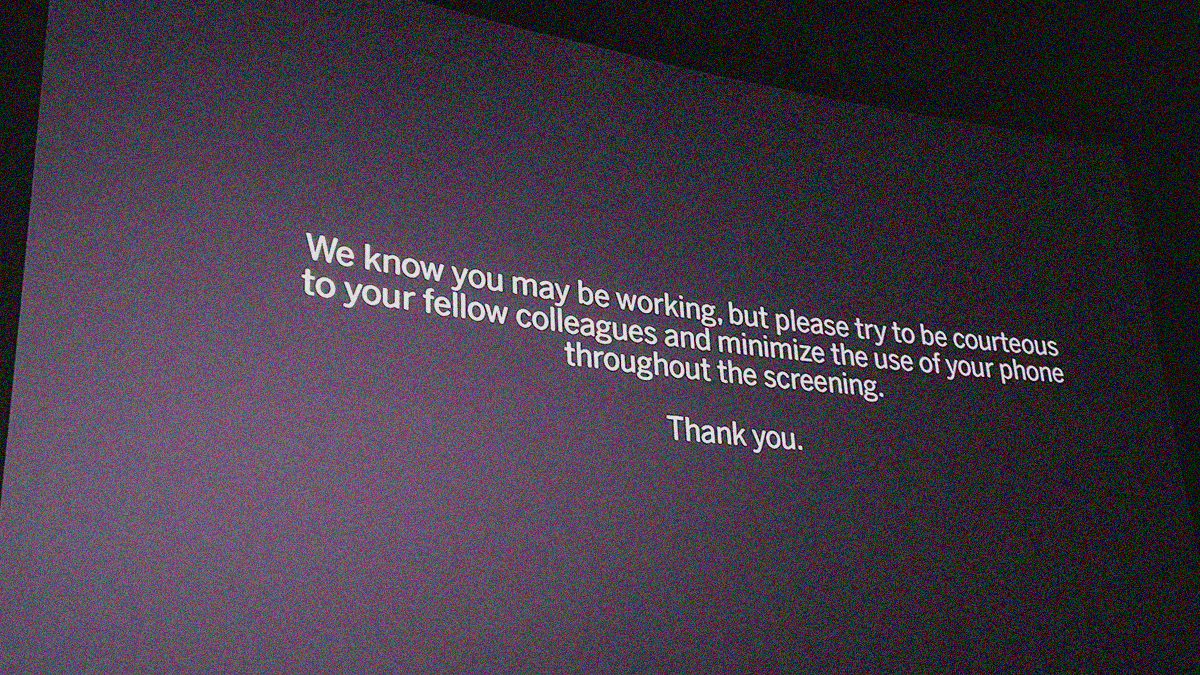
I will never get over this text. It's been three years and it still irks me to see it up there with its "try" as though anyone in a press & industry screening is engaged in a life or death scenario wherein they cannot put their phone in their pocket.
Thankfully, my TIFF was well-behaved this year. I actually thought I was going to escape without ever truly remembering a single moment where someone's phone distracted me.
Then came Normal. My last screening in Toronto.
The IMAX theater was only two-thirds full and the dude crept past me as the film was starting. His phone came out as soon as he sat and he was on it for about 75% of the runtime. I'll give him credit for dimming the brightness, but what's the point of being there? He even left before the epilogue.
People still wonder why I don't go to the movies anymore, though. Well, when theaters cater to their worst patrons, those who truly care lose.
Today's schedule:
• Flana, d. Zahraa Ghandour | TIFF Docs | Iraq, France, Qatar | Arabic
• Oca, d. Karla Badillo | Discovery | Mexico, Argentina | Spanish
• Our Father, d. Goran Stankovic | Discovery | Serbia, Italy, Croatia, North Macedonia, Montenegro, Bosnia and Herzegovina | Serbian

Nika & Madison
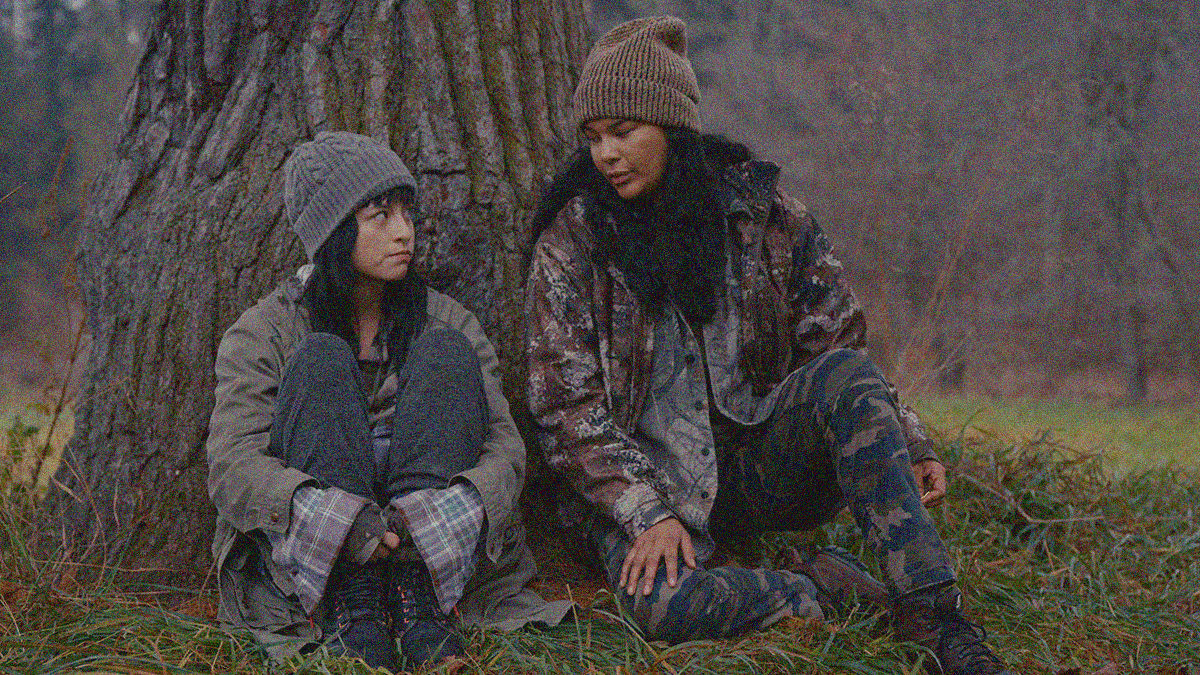
Nika (Ellyn Jade) and Madison (Star Slade) didn't leave things well the last time they spoke. The latter was off to university in Toronto while the former was staying behind on the reservation where they were born. We don't know exactly what was said, but everyone knows there was enough friction to ask if they'd patched things up with Madison coming home soon. Nika says it's all good. That they're cousins and they love each other. But there's something else hiding below the surface. Something she's not ready to admit.
Adapted from her own short film Redlights, director Eva Thomas and co-writer Michael McGowan open Nika & Madison with the perfect juxtaposition of these girls' lives and how very different settings ultimately reveal similar hardships. You mustn't look further than Madison's school friend making a wild assumption about the reservation being primitive living before admitting she often forgets Madison is Native at all. It's the sort of casual racism you can expect as someone proud of their heritage regardless of passing. The world wants to forget.
Well, things only get worse from there as Madison's return starts at a local haunt and ends with a fight. The cops are called, but charges aren't pressed. PC Boyd (David Reale) puts her in the squad car anyway to escort her home. We eventually learn he never called it in, though. Never even wrote her name. So, guessing where things are headed isn't difficult once Nika hops in her car to follow her cousin's GPS and meet her at the station only to wind up at a factory closed for the night. What she saw upon arrival was even more unexpected.
The film's central goal is to put these two back together after their relationship strained. It's to remind them that they'll always have each other's backs no matter what and should know there's nothing they cannot confide to stop feeling so alone. That's exactly what occurs as they go on the lam considering the writing is on the wall that an arrest is coming. They agree to just stick close and face it together. Because the same forces that allow Boyd to do what he did make it so he will probably get away with it.
Cue the politics—both externally and internally. The reservation is sovereign land, so Detective Sergeant Timmins (Amanda Brugel) and Detective Warhurst (Shawn Doyle) cannot enter without a warrant. Chief Sampson (Gail Maurice) isn't going to simply grant them access because she knows the truth isn't often enough to stop the government or law enforcement from railroading Native people. The lawyer hired to help the girls explains how half the incarcerated women in the country are indigenous despite only making up five percent of the population.
The pursuit therefore becomes a series of contrasts. Most of the residents feign ignorance when shown Madison's photo, but one woman (Pamela Matthews' Trudy) never liked the girls' troublemaking mothers. Warhurst bleeds blue to the point where he's working through excuses for sounds Boyd's squad car picked up rather than following logical instincts while Timmins labels anyone who isn't willing to admit what's happened a coward. That's the situation, though. Indigenous people are deemed expendable. It's why Nika and Madison ran.
Are they purposefully evading the police? Sure. But they aren't fugitives ... yet. Just as their Chief wanted to control the narrative, they don't want to turn themselves in prematurely and allow lies to take root. So, Madison gets a taste of Nika's life hunting and Nika gets a taste of Madison's big city living. And they attempt to distract themselves from their reality while also confronting how what happened is a result of more than just the moment itself. Such abuses are not isolated incidents and conceding that truth might help them heal.
Nika & Madison isn't therefore about justice or revenge. It's about understanding and love. How two cousins can be totally different and yet still relate to and appreciate both the good and bad that they've experienced. Nika was there for Madison when she needed it the most and Madison will return the favor. All the rest is noise. Horrific realities that truly could turn fatal fast without a Timmins to talk sense, but narrative maneuvers to force these girls back into each other's lives, nonetheless. That's what resonates. Their bond to never stop fighting to survive.
Jade and Slade are great in the titular roles. Both get lost in their characters to render their disparate lifestyles authentic and find the rapport to mock the other when dipping a toe into the opposite environment. We laugh when Nika calls Madison an "Insta princess," but it's not long before the latter's fear of the wilderness takes hold. We laugh some more when Madison gets Nika to wear one of her clubbing outfits ("Where does everything go?!"), but she eventually embraces the chance for release. Nothing is too scary if they're together.
7/10
The Son and the Sea
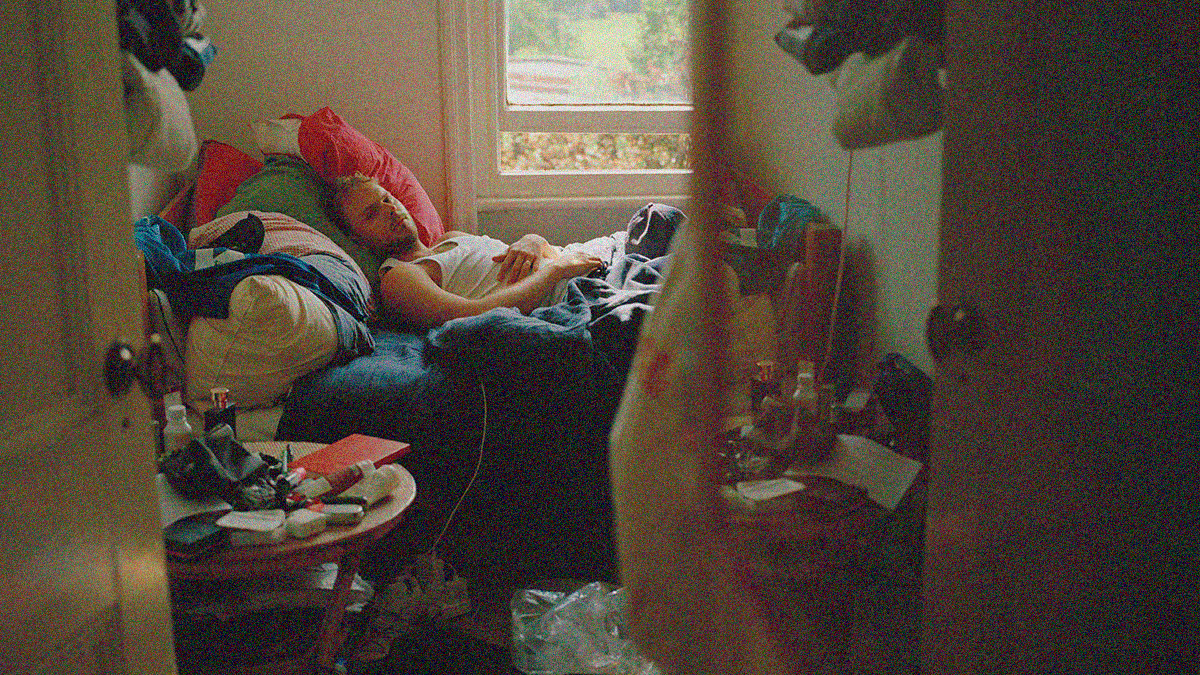
It's a slice of life drama centered upon a selfish young man named Jonah (Jonah West) seeking a reprieve from languishing in the doldrums of his drug-fueled existence. So, he decides to leave London behind, using his aunt's recent dementia diagnosis and subsequent nursing home stay as an excuse for the destination since he knows her old waterfront Scottish shack will be empty. Not wanting to be alone, he cajoles Lee (Stanley Brock) into coming with him despite officially hitting the breaking point where remaining Jonah's friend is concerned.
The Son and the Sea is a family affair. Stroma Cairns directs and co-writes with her mother Imogen West while the lead is their brother and son respectively. Some of the story stems from Stroma's hearing loss. Some from the impact of father figures present and not. A lot of Jonah's on-screen pain is a result of his grief towards losing his dad and still being unable to get out of his own way to move forward. He tells his younger half-sister to celebrate her father's birthday before leaving because he wishes he could still celebrate with his.
Parenthood looms large on the Sottish coast too once these city slickers run into a pair of Deaf twins at a bar outside where Jonah's aunt lives. Charlie (Connor Tompkins, who along with his brother Lewis were the subjects of Cairns short film If You Knew) is visiting Luke (who has a young son of his own), but having a rough go at emotionally connecting with him. They have their reasons—partially a byproduct of their relationship with their own father—so Charlie takes a shine to Lee and Jonah to hang out with them instead.
The over-arching narrative is one of self-discovery. As such, the plot points are generally very specific to each of these three individuals separately so their consequences can ultimately lead them onto a single road of convergence by the end. Lee's struggles with Jonah's tempestuous mood swings. Charlie's attempts to knock sense into his engineer-turned-drug dealer brother. And Jonah's journey to find the space to allow himself to be vulnerable for his own sanity let alone others. They seek satisfaction through doing rather than sharing and that must change.
It's therefore the tenuous nature of mortality that wakes them up to the fact their suffering might not be as debilitating as they think. That there's more to the world than their tiny sliver. More people much worse off. Charlie's presence alone helps open Jonah's eyes from impatiently not wanting to do the work to converse with him to genuinely calling him a friend. That's what happens when you open yourself up to listening—you discover how those different from you truly aren't that different at all. Your experiences are never that unique.
Tempers flare and the desire to push each other away instead of holding each other close arises often. They eventually find solace in the beauty of nature to slow down, embrace the quiet, and live in the moment so as not to get constantly bogged down by the past. It's about acceptance too. Accepting one's anguish and deciding to fight through it rather than succumb. Because Jonah grows impatient with his aunt too. He sees her silently sitting in a chair and rejects the premise of having to do the work to reconnect. But no one said love was easy.
Add young Sandy (Grant Lindsay) to the mix—a local boy acquainted with Luke who Jonah, Lee, and Charlie start to run into often—and you can sense how interconnected small towns like this are. How one tragic event can ripple through the streets to knock everyone down unlike life in the big city creating isolated pockets with which to lose yourself in the false notion that no one else cares about your pain. Heck, a random farmer Jonah and Lee visit to get a glass of water lets them borrow his boat on a whim. Country rules are different.
With that easy camaraderie comes a much more potent ache when things go wrong, though. You begin to feel like you're a part of your neighbors' lives even if you've only met them a day or two prior. And that family-like sense of community is exactly what Jonah needs to shake him from his own self-pitying malaise. To remind him that his aunt is more than just a free house. That Lee is more than just a plaything to accost when needed and ignore the rest of the time. Life is a slippery slope. You can only hope to be ready when the next challenge arrives.
West is great in the role. His Jonah is the type of guy you hate to love because you're never quite sure if he even sees you at all. But you stick around because you know it's not his fault. You know he's hurting. You just wish he'd admit it to himself so that you can help him out of the hole. Brock's Lee and Tompkins Charlie are that outstretched hand for him and Luke respectively. They're frustrated but loyal and we grow invested in their empathetic desire to keeping trying because we don't want their efforts to be in vain.
Credit Cairns and Imogen West for facilitating those authentic dynamics via a script that refuses to bend to clichés or concrete resolutions. The Son and the Sea is built as a journey rather than a means to an end. It's about setting these three men onto a path wherein they each find themselves stronger after having endured the hardships of dealing with people who cannot escape themselves (even if that person is them). And there's nothing like reaching that epiphany amidst the beauty of salted air and sea-swept shores.
7/10

Pulled from the archives at cinematicfbombs.com.
3 Generations (as About Ray) screened on September 12, 2015 at TIFF.



